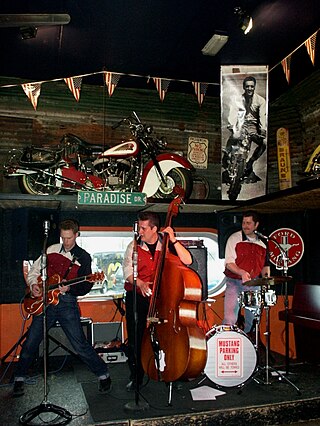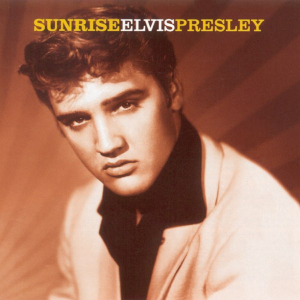Related Research Articles

Slide guitar is a technique for playing the guitar that is often used in blues music. It involves playing a guitar while holding a hard object against the strings, creating the opportunity for glissando effects and deep vibratos that reflect characteristics of the human singing voice. It typically involves playing the guitar in the traditional position with the use of a slide fitted on one of the guitarist's fingers. The slide may be a metal or glass tube, such as the neck of a bottle. The term bottleneck was historically used to describe this type of playing. The strings are typically plucked while the slide is moved over the strings to change the pitch. The guitar may also be placed on the player's lap and played with a hand-held bar.

The Treniers were an American R&B and jump blues musical group led by identical twins Cliff and Claude Trenier. They were originally billed as the Trenier Twins, who performed alongside the Gene Gilbeaux Quartet, but shortened their name to the Treniers when Gilbeaux and other musicians became integral members of the group. Besides the Trenier brothers, group members included Don Hill on saxophone, Shifty Henry and later James (Jimmy) Johnson on bass, Henry (Tucker) Green on drums and Gene Gilbeaux on piano. Later, additional Trenier brothers Milt and Buddy, and nephew Skip, joined the group on vocals, and there were many other musician and line-up changes over the years including Herman Washington and Mickey Baker on guitar.

Rockabilly is an early style of rock and roll music. It dates back to the early 1950s in the United States, especially the South. As a genre, it blends the sound of Western musical styles such as country with that of rhythm and blues, leading to what is considered "classic" rock and roll. Some have also described it as a blend of bluegrass with rock and roll. The term "rockabilly" itself is a portmanteau of "rock" and "hillbilly"; the latter is a reference to country music that contributed strongly to the style. Other important influences on rockabilly include western swing, boogie-woogie, jump blues, and electric blues.
The origins of rock and roll are complex. Rock and roll emerged as a defined musical style in the United States in the early to mid-1950s. It derived most directly from the rhythm and blues music of the 1940s, which itself developed from earlier blues, the beat-heavy jump blues, boogie woogie, up-tempo jazz, and swing music. It was also influenced by gospel, country and western, and traditional folk music. Rock and roll in turn provided the main basis for the music that, since the mid-1960s, has been generally known simply as rock music.

Aubrey Wilson Mullican, known professionally as Moon Mullican and nicknamed "King of the Hillbilly Piano Players", was an American country and western singer, songwriter, and pianist. He was associated with the hillbilly boogie style which influenced rockabilly. Jerry Lee Lewis cited him as a major influence on his own singing and piano playing.
The Bakersfield sound is a sub-genre of country music developed in the mid-to-late 1950s in and around Bakersfield, California. Bakersfield is defined by its influences of rock and roll and honky-tonk style country, and its heavy use of electric instrumentation and backbeats. It was also a reaction against the slickly produced, orchestra-laden Nashville sound, which was becoming popular in the late 1950s. The Bakersfield sound became one of the most popular and influential country genres of the 1960s, initiating a revival of honky-tonk music and influencing later country rock and outlaw country musicians, as well as progressive country.

"Rock Me Baby" is a blues standard that has become one of the most recorded blues songs of all time. It originated as "Rockin' and Rollin'", a 1951 song by Lil' Son Jackson, itself inspired by earlier blues. Renditions by Muddy Waters and B.B. King made the song well-known. When B.B. King's recording of "Rock Me Baby" was released in 1964, it became his first single to reach the Top 40 in Billboard magazine's Hot 100 chart.

Sunrise is a two-disc compilation of Elvis Presley's studio recordings at Sun Studio from 1953 to 1955, released in 1999, RCA 67675-2. This set features all of the surviving master recordings made by Presley and his accompanists, Scotty Moore and Bill Black, occasionally augmented by other musicians, prior to his arrival on RCA Records in 1956.

Last Man Standing Live is a live album by Jerry Lee Lewis recorded in September 2006, in cooperation with other musicians. It was released in March 2007, and was Lewis' first live album in thirty-seven years, after Live at the International, Las Vegas in 1970.

Rock 'n Roll Stage Show is the first studio album and fourth overall album by rock and roll band Bill Haley and His Comets. Released by Decca Records in August 1956, it was the group's first album to include new, as opposed to previously released material. Although the album spawned several singles, it also featured several album-only tracks.

Rockin' Around the World was the sixth album of rock and roll music by Bill Haley and His Comets. Released in March 1958 on the Decca Records label, Decca 8692, the album was produced by Milt Gabler, who produced all of Haley's recordings for Decca. It was the second of three "themed" albums that Haley produced for the label. This album featured versions of well-known folk songs from around the world, rearranged in rock and roll style, including new lyrics, by Haley and his songwriting partners, Milt Gabler, Rusty Keefer, and Catherine Cafra. It is not known how much, if any, input Haley himself had into the writing process.
Jerry Naylor Jackson was an American country and rock and roll artist, broadcaster and inspirational speaker. From late 1961 through 1964 he was The Crickets' lead vocalist.
"The Race Is On" is a song written by Don Rollins and made a hit on the country music charts by George Jones and on the pop and easy listening charts by the unrelated Jack Jones. George's version was the first single released from his 1965 album of the same name. Released as a single in September 1964, it peaked at number three on the Billboard Hot Country Singles chart and at number 96 on the Billboard Hot 100 in January 1965. Jack's version topped Billboard's Easy Listening chart and reached number 15 on the Hot 100 the same year. The two recordings combined to reach number 12 on the Cashbox charts, which combined all covers of the same song in one listing and thus gave George Jones his only top-40 hit. The song uses thoroughbred horse racing as the metaphor for the singer's romantic relationships.

Boston Music Hall, 12/5/72 is an album by the country rock band the New Riders of the Purple Sage. It was recorded live on December 5, 1972, at the Music Hall in Boston, Massachusetts, and released on November 11, 2003. It was the second complete New Riders concert that was recorded in the 1970s and released in the 2000s as an album on the Kufala Recordings label.
Oscar "Buddy" Woods was an American Texas blues guitarist, singer and songwriter.

The Smithsonian Collection of Classic Jazz is a six-LP box set released in 1973 by the Smithsonian Institution. Compiled by jazz critic, scholar, and historian Martin Williams, the album included tracks from over a dozen record labels spanning several decades and genres of American jazz, from ragtime and big band to post-bop and free jazz.

"Hot Dog Buddy Buddy" is a 1956 rock and roll song composed by Bill Haley and released as a Decca single and also on Brunswick. The song appeared in the 1956 Columbia Pictures movie Don't Knock the Rock.

Live at Dancetown U.S.A. is a live album by American country music artist George Jones. It was recorded in 1965 but was not released until 1987.
References
- ↑ Oscar Bergen Riley at FindaGrave.com. Retrieved 27 January 2013
- 1 2 3 Buddy Jones at Shreveport Songs, 16 October 2011. Retrieved 27 January 2014
- ↑ allmusic ((( Buddy Jones > Overview )))
- ↑ "The Straight Dope: Who invented the term "rock 'n' roll"?". Archived from the original on 2008-08-29. Retrieved 2007-08-13.
- ↑ 403 Forbidden Archived March 31, 2015, at the Wayback Machine